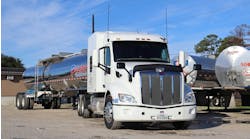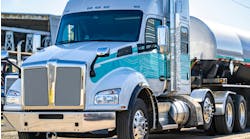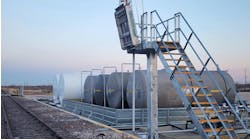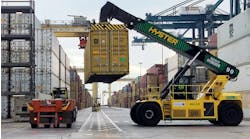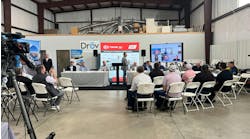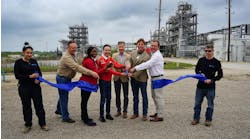J&M Tank Lines, an Alabama-based, family-owned enterprise, requires personal experience to steer toward success.
Luckily, there's few more experienced than CEO Harold Sumerford, Jr., who worked his way up as a preventative-maintenance technician to buying the company from his father in 2014. But Sumerford doesn't only share his time with the 1948-founded organization; he's also the 77th Chairman of the American Trucking Associations, making his years in the industry a valuable asset for all.
"Harold is the consummate professional, and a tremendous ambassador for our industry," said Chris Spear, ATA president and CEO. "His story—working in the family business until he ran the family business–could not be more representative of what trucking is all about."
Sumerford has always been about trucking. He started out working for the family fleet as a teenager performing preventative maintenance, splitting time between the shop and high school in the late 1970s. His father bought into the company in the 1960s and became the owner in early 1980s. Sumerford and his brother Peter Sumerford, J&M's president, became owners when their father passed away in 2014. They both have run the company since 2002. In that time, Sumerford said the company increased revenue by 350%, according to the Birmingham Business Journal.
Tremendous growth is made possible by Sumerford's experience and the uptime provided by the fleet's maintenance facilities. With 11 shops across four states, J&M Tank Lines needs to haul industrial commodities, plastics, and foodgrade products at the highest levels of productivity. Today at the company, a wide range of fleet management expertise is making all the difference and paving the way for other shops to follow.
A roadmap for maintenance
The J&M Tank Lines maintenance operation is headed up by Billy Lollar, VP of maintenance, who joined the company 10 years ago and brought with him years of commercial vehicle service experience with major leasing companies. Jeff Arledge, director of maintenance, came to J&M after serving at a well-known and highly respected foodservice distribution company. The carrier also is using the services of DWS Fleet Management (DWSFM) and Netradyne’s Driver•i vision-based camera platform.
At J&M shops in Alabama, Georgia, Texas, and South Carolina, a staff of 55 supervisors, managers, and Paccar-certified technicians maintains and repairs 467 power units, about 800 trailers, and a mix of support vehicles. Wash service for the fleet of mainly Kenworth T680 tractors, Heil and Polar tankers, and Tremcar dry bulk trailers also is provided at these shops. The entire operation is supported by a corporate maintenance group and a host of drivers.
“About one year ago, we began implementing a series of initiatives,” Lollar said. “On a regular basis, we’ve been putting our knowledge together and sharing ideas. We’re all generally on the same page. Mostly it’s about executing a plan and it all starts with the basics. If you do those things, everything else will fall into place.”
See also: Bulk haulers turn to Netradyne for smarter camera safety
What Lollar is referring to is a task list that has served as a roadmap for success. It starts, for example, with addressing shop and yard cleanliness.
“We had areas with room for improvement regarding organization,” Arledge said. “That’s been one focus in our daily operations, and we’ve seen that clean and well-organized shops are more productive.”
Also high on the task list is a deep dive into the fleet’s tractor and trailer preventive maintenance programs, including a review of tools and equipment. “We’ve been refreshing current procedures and schedules, and improving how we manage them,” Lollar stated. “This effort has also shown how our collective expertise leads to beneficial solutions.”
Lollar also pointed to the fleet-wide implementation of maximized tractor oil drain intervals.
“Longer intervals made sense, but we were concerned about keeping up with driveline lubrication because we have PTO-driven pumps for unloading trailers,” he explained further. “With a simple change to include grease every time a truck is in one of our shops, we were able to address both issues and now we’re seeing the benefit in lower costs.”
Moving beyond PMs
Another item was a review of the fleet’s tire program. J&M, noted Arledge, has installed Halo Tire Inflator Systems from Aperia Technologies on tractor drive axles, which has eliminated many flat-tire occurrences.
There has also been a focus on inspection efforts overall at J&M, including pre-trips conducted by drivers.
“We were seeing some CSA score increases and the violations were for things that could have been addressed,” Lollar said. “By involving drivers and putting up reminders as simple as signs in the yard, those scores have gone down.”
Parts inventory organization and needs are being addressed as well. Among the questions asked are determining items to order in advance through established vendors, including MHC Kenworth dealers, FleetPride, and several trailer parts suppliers. Keeping an eye on hard-to-get items is especially important given current supply chain challenges, Lollar noted.
“We need to determine the inventory we need to keep on-hand and what we can order as needed,” Lollar continued. “There’s a balance between parts inventory and vehicle uptime. We’re in the truck utilization business, so we need to have parts in stock that keep technicians busy and drivers on the road.”
Partners for the long haul
Like most fleet shop operations, recruiting technicians can be a challenge for J&M.
“We realized that to get good technicians, we have to grow our own,” Arledge stated. “Technicians we’d like to hire usually have jobs they don’t want to leave, and people who move from job to job regularly aren’t those who will stay with you.”
But an approach J&M has put in place is paying off.
“We’ve partnered with Wallace State Community College, which offers Diesel by Distance, a flexible diesel technology training program,” Arledge explained. “Students take classes online and spend weekends in hands-on training. At the end of 18 months, they earn a diesel certificate and a CDL. It’s proven to be great for us and the students.”
As parts of its involvement, J&M is promoting the program to wash bay employees who are interested in what Arledge called “a life-changing opportunity.” Students are then offered jobs as technician helpers in a company shop where they can gain more experience.
The task list at J&M is also focused on managing warranty and the work being done by outside vendors, as well as measuring shop performance by developing KPIs from data in its TMT Fleet Maintenance software.
“There are several things we’d like to measure, including breakdowns and repairs between PMs, downtime, labor costs, and PM compliance,” Lollar said. “We’re already doing a lot of positive things but with this capability we can execute at all levels.”
Lollar is pleased with the progress achieved so far.
Looking forward, he noted, J&M will continue building a foundation for success by focusing on meeting challenges and implementing best practices.
